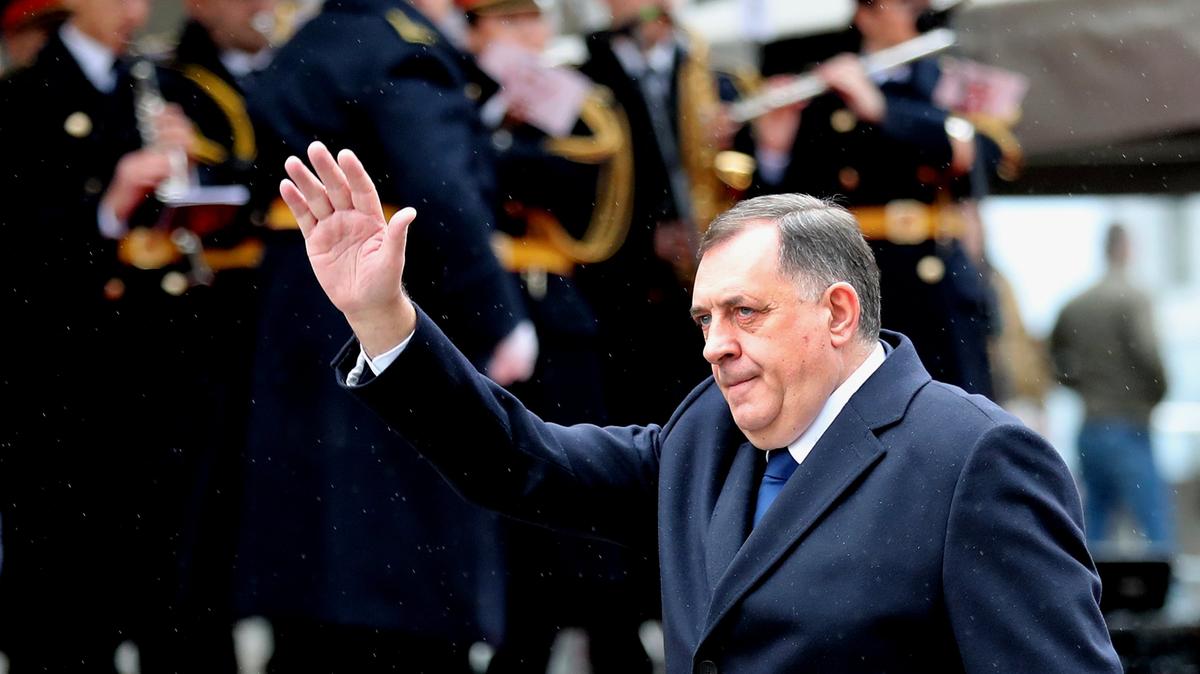Milorad Dodik made headlines last month when he predicted he would be the first president of an independent Serbian entity on Bosnian soil and threatened to secede from Bosnia and Herzegovina, the fragile federation that was created by the 1995 Dayton Agreement to end the Bosnian War.
The president of the Serbian-dominated Republika Srpska, which makes up half of Bosnia and Herzegovina, has long been seen as the man most likely to bring about the break-up of the country, a prospect that would delight one Vladimir Putin.
Hailed as a democratic leader who was a “worthy partner” and a “breath of fresh air”, by US Secretary of State Madeleine Albright in 1998, Dodik’s transformation from democrat to demagogue since then culminated with him being sanctioned by the US last year for using his position to “accumulate personal wealth through graft, bribery, and other forms of corruption”.
In October, the US sanctioned Dodik’s adult children, along with four companies that it said “facilitate Dodik’s ongoing corruption” and allow him to “syphon public funds from the Republika Srpska and enrich himself and his family”.
Dodik’s transformation has even seen him walk back his earlier recognition that the atrocities carried out in Srebrenica amounted to genocide, calling the 1995 massacre of 8,000 Bosniak men and boys “an arranged tragedy” in 2018. Similarly, having once advocated the prosecution of war criminals Ratko Mladic and Radovan Karadzic, Dodik struck a rather different tone on the eve of Mladic’s conviction for war crimes in the Hague, when he said that “whatever the verdict … Ratko Mladic remains a legend for the Serbian people”.
Dodik, whose ties to the Kremlin have become ever tighter in the past 15 years, now downplays Serbian atrocities in the Bosnian War, and has repeatedly visited Vladimir Putin in Moscow. What exactly has changed?
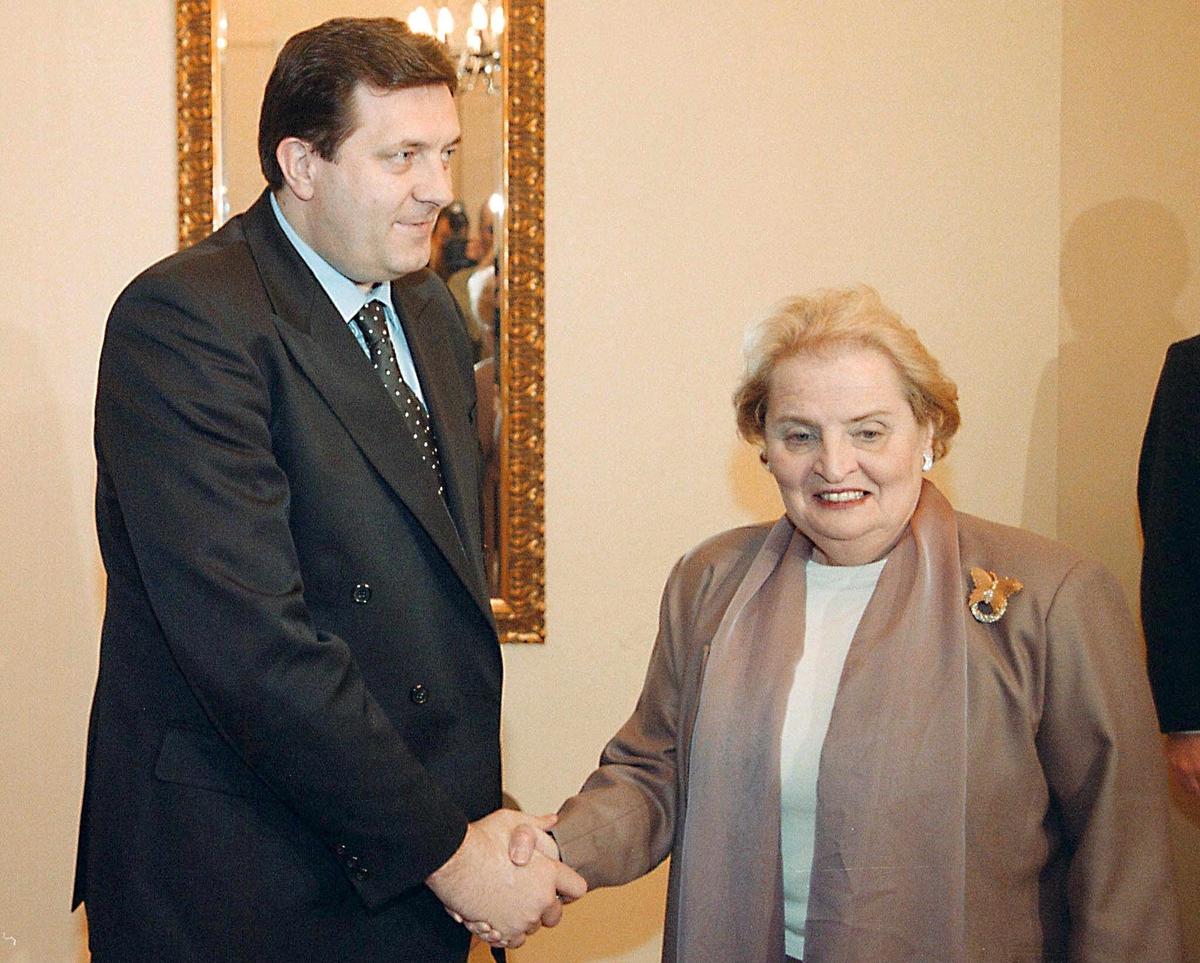
US Secretary of State Madeleine Albright is greeted by Bosnian Serb Prime Minister Milorad Dodik on 9 March, 2000. Photo: EPA PHOTO EPA POOL/DRAGO VEJNOVIC
Rhetorical chameleon
“Dodik has a nationalist underpinning that has always been there,” says University of Vienna politics lecturer Vedran Dzihic. “He is an opportunistic nationalist … looking for ways to make his dreams of power and personal enrichment come true. This has been a common thread throughout his political life.”
Dzihic argues that Dodik’s moderate discourse in the early 2000s was a means to an end that won him financial support from the US. “A rhetorical chameleon, he can adjust his discourse quite quickly. He was able to tell the story of democracy in Bosnia that the Americans wanted to hear then.” As US and EU interest in Bosnia faded, Dodik slowly underwent a metamorphosis.
“From a great hope he turned into a political monster,” says Republika Srpska-based political commentator Tanja Topic, one of Dodik’s most outspoken critics and someone he has targeted personally in public attacks.
“In terms of understanding democracy and living its values, he showed huge deficits, he always took criticism badly, he insulted political opponents, limited journalists’ access if they criticised him. He strengthened his authoritarian traits over the years.”
Born in 1959 to a family of farmers in Banja Luka, now the administrative centre of the Republika Srpska, Dodik played in the local basketball team, and former teammates recall that he approached basketball much as he now does politics — aggressively, and using his significant body weight to intimidate smaller opponents.
After graduating high school in Banja Luka, Dodik studied politics at the University of Belgrade before entering politics as, in Topic’s words, a “young and promising politician”. In 1990, following Yugoslavia’s first multiparty elections, Dodik entered the National Assembly as a deputy of the Union of Reform Forces, a liberal, anti-nationalist political party opposed to the dissolution of Yugoslavia that was led by that country’s final prime minister, Ante Markovic.
In 1996, Dodik created the Independent Social Democrats, a moderate party that went up against the ultra-nationalist Serb Democratic Party, led by Radovan Karadzic, the first president of Republika Srpska, now in jail for war crimes. Despite Dodik’s party winning just two of the 83 seats in the Republika Srpska Assembly in 1997, a series of crises in the political establishment led to him becoming the prime minister the following year.
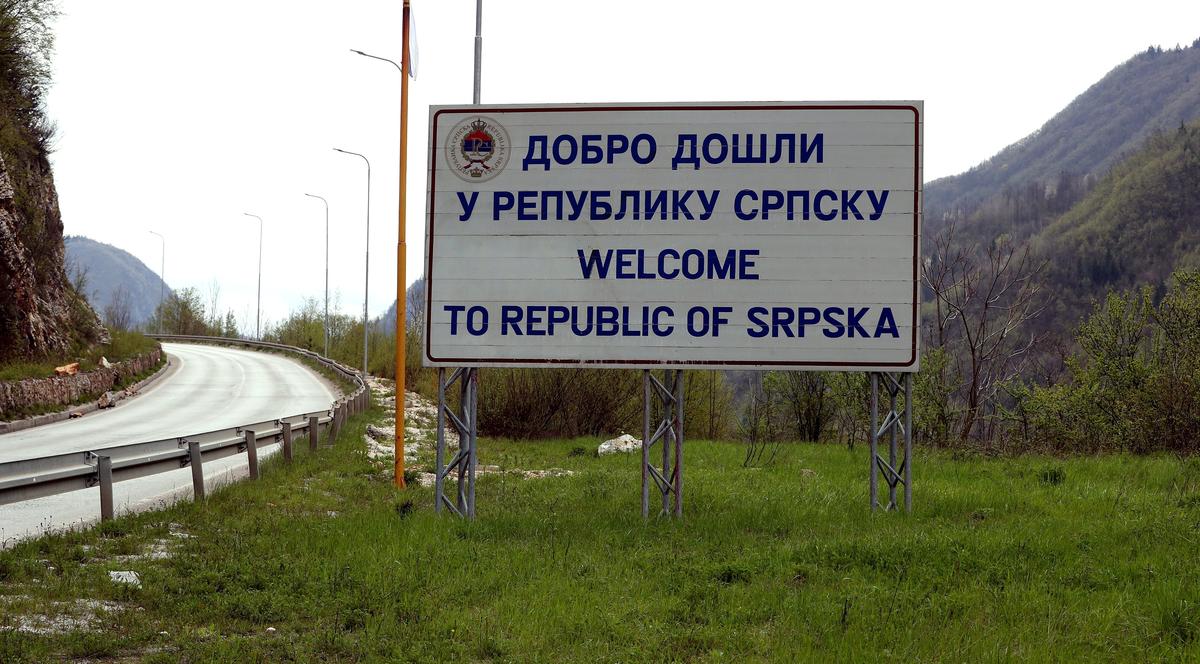
A road sign reading 'Welcome to the Republic of Srpska' on the outskirts of Sarajevo, Bosnia and Herzegovina. Photo: EPA-EFE/FEHIM DEMIR
It was during this time that Dodik called for Karadzic and Mladic to be tried at the International Criminal Tribunal for the former Yugoslavia, burnishing his social democratic credentials with the West. This paid off significantly during his second term in 2006–2010 — which Topic calls his “golden age” — when Dodik managed to secure substantial financial aid and political support from the EU and the US.
Brother Slavs
Given the longstanding historic and cultural ties between Serbia and Russia, as well as Moscow’s support for ethnic Serbs during the Yugoslav wars, it’s perhaps not surprising that Dodik increasingly looked to Moscow at a time when Bosnia looked to Brussels. To this day any meeting with the Russian leader boosts Dodik’s image domestically, and from 2007, Dodik began to reorient himself definitively towards Russia.
For its part, Moscow was receptive, seeing Dodik as a useful agent of chaos who could be used to further Russia’s main goal in the western Balkans, namely the frustration of further EU integration. Dodik has now met Putin dozens of times, and appears to have lost none of his admiration for the Kremlin strongman since he ordered the full-scale invasion of Ukraine last year.
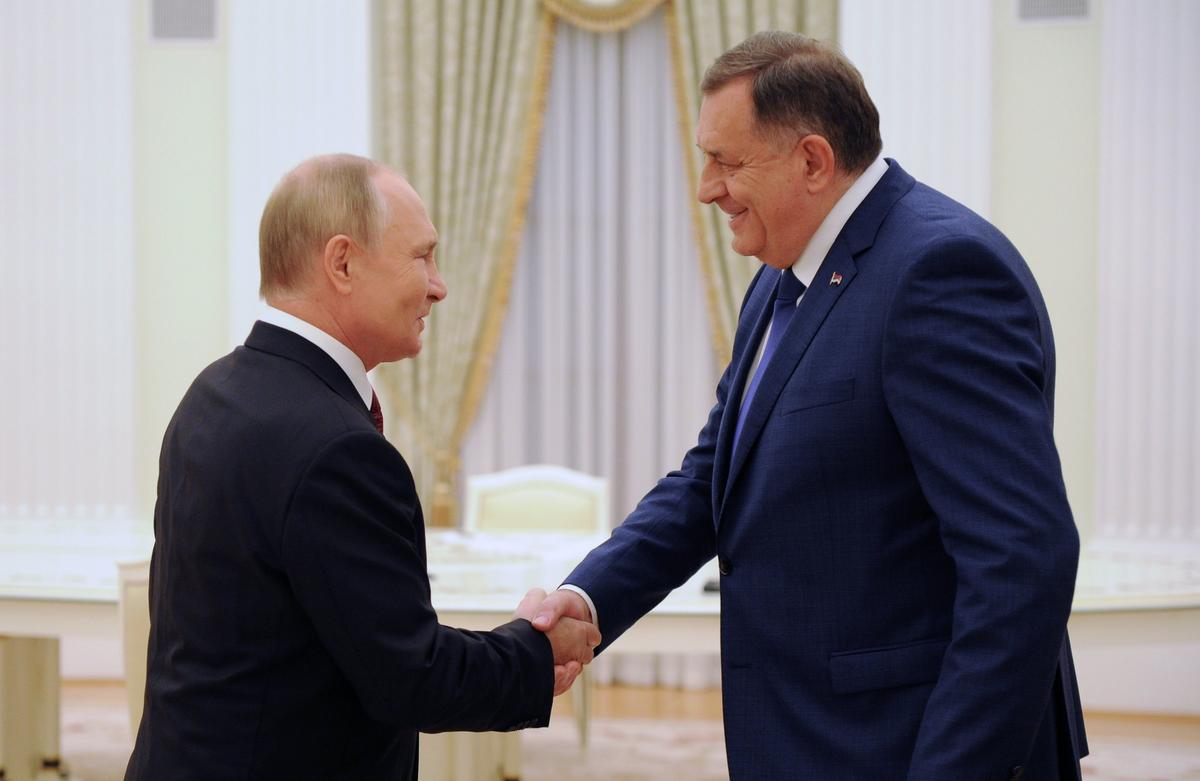
Vladimir Putin shakes hands with Milorad Dodik during their meeting in Moscow, Kremlin, Russia, 20 September 2022. Photo: EPA-EFE/MIKHAEL KLIMENTYEV / SPUTNIK / KREMLIN POOL
“This is not a war between Ukraine and Russia — this is a clash between [Russia and] the West, which is trying to use Russia as a way to further inflame this war,” Dodik said in May during a visit to Moscow to see Putin, who subsequently thanked his guest for what he termed his “neutral” position.
In January, Dodik awarded the increasingly isolated Russian president the Republika Srpska’s highest honour for his “patriotic concern and love”. Shortly afterwards, Dodik was awarded Russia’s Order of Alexander Nevsky in return.
Dodik’s ties to Russia are economic as well as political, and he is believed to profit directly from Russian company Neftegazinkor’s takeover of Republika Srpska’s oil industry in 2007.
Bosnia’s former police head, Zlatko Miletic, has called Dodik somebody who is “most certainly involved in organised crime”.
Misdirection
Vedran Dzihic believes Dodik’s growing secessionist rhetoric is a form of misdirection aimed at hiding his extreme desire for money and power. “In order to compensate for his obsessive self-enriching tendency, Dodik uses nationalist and anti-EU rhetoric,” Dzihic says.
The US sanctions came a few months after Dodik threatened to pull Republika Srpska out of Bosnia’s federal judiciary, army and taxation system — steps that have been interpreted as precursors to secession — following legislation that makes denying the genocide at Srbrenica a criminal offence in Bosnia.
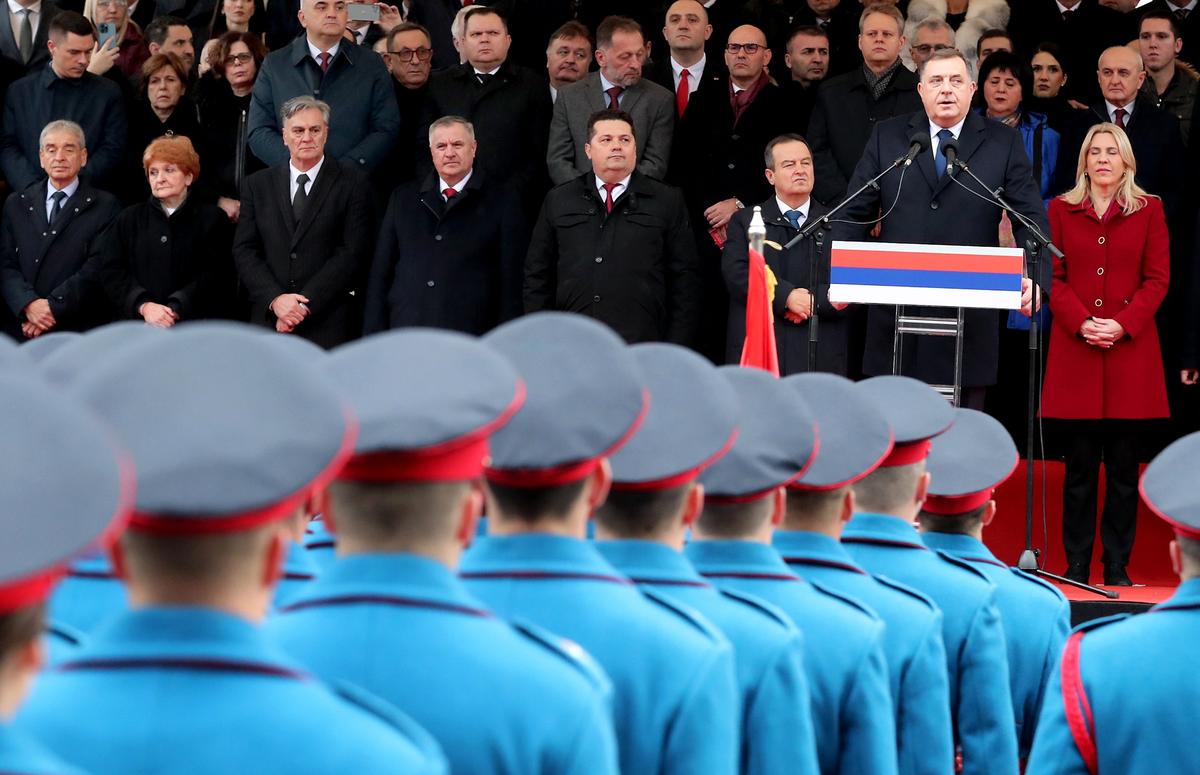
President Milorad Dodik speaks at a parade in East Sarajevo, Bosnia and Herzegovina, 9 January 2023 to mark the Day of Republika Srpska. Photo: EPA-EFE/FEHIM DEMIR
Dodik has also repeatedly defied the recently appointed High Representative for Bosnia and Herzegovina, Christian Schmidt, who is responsible for overseeing the implementation of the Dayton agreement that ended the war in 1995. In the summer of 2021, the UN Security Council rejected a motion submitted by Russia and China to dissolve the role of Bosnia’s High Representative.
Russia also appears to be behind campaigns of genocide denial in the Western Balkans, with NGOs such as the Gorchakov Fund, whose trustee board chairman is none other than Russian Foreign Minister Sergey Lavrov, convening revisionist conferences that deny the Srebrenica massacre while excluding testimony from the victims’ families.
While Russia may try to destabilise the Western Balkans in its fight to prevent EU enlargement, Topic argues that Dodik’s reasons for pursuing secessionism are not just money and power, but self-delusional narcissism as well.
“He believes and tries to convince the public that he is the Serbian messiah,” she says, “a great leader, who has the mission to unite the Serbs and create a Serbian state within the borders of Bosnia and Herzegovina.”
Join us in rebuilding Novaya Gazeta Europe
The Russian government has banned independent media. We were forced to leave our country in order to keep doing our job, telling our readers about what is going on Russia, Ukraine and Europe.
We will continue fighting against warfare and dictatorship. We believe that freedom of speech is the most efficient antidote against tyranny. Support us financially to help us fight for peace and freedom.
By clicking the Support button, you agree to the processing of your personal data.
To cancel a regular donation, please write to [email protected]
